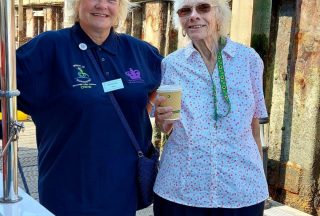Caring for someone who is autistic can be very demanding and bring its own set of challenges. All autistic people are different, but most experience difficulty with social interactions and communication, and in how they experience and understand the world around them.
The National Autistic Society has a great video on an introduction to autism for young non-autistic audiences, aiming to raise awareness, understanding and tolerance in future generations – www.youtube.com/watch?v=RbwRrVw-CRo
You may be a parent looking after a younger child who is autistic, or perhaps you look after an adult. No matter your situation, here are some resources and information that may help you…
Caring for a child who is autistic:
Looking after a child who is autistic may mean you might need to spend a lot of time helping your child get the support they need. This can be very stressful and exhausting, so it’s important to remember to take time for yourself for your own health and wellbeing when you can.
Some children find it helpful to meet other autistic children and to learn that they are not alone. The National Autistic Society – www.autism.org.uk – has an Autism Services Directory lists social groups, after-school clubs and support groups around the UK – www.autism.org.uk/autism-services-directory
Autism Unlimited – www.autism-unlimited.org – is a local charity that support for anyone affected by autism, their support includes education for children and young people who are autistic and associated difficulties aged 3-19 – www.autism-unlimited.org/education
They also offer a Information and Support Service – www.autism-unlimited.org/support – that can answer general questions about autism and Adult support which offers a range of personalised social care services for people with autism and associated difficulties – www.autism-unlimited.org/adult-support
The NHS also has a guide for parents looking after a child who is autistic that you may find helpful – www.nhs.uk/conditions/autism/autism-and-everyday-life/help-for-families
Caring for an adult who is autistic:
It may be that your child has now turned 18 and you are still looking after them, or perhaps you look after an adult sibling, relative or friend.
There may be a lot of changes when someone who is autistic turns 18, they may see different doctors or health professionals or be moving to a different education setting. The NHS has a guide on changing from child to adult care when your child turns 18 – www.nhs.uk/conditions/autism/autism-and-everyday-life/changing-from-child-to-adult-care
It is important to note that the general rights of parents and disabled children under 18 remain the same. This means that parents still have the right to request an assessment of their child’s needs – www.contact.org.uk/help-for-families/information-advice-services/social-care/how-to-access-services/needs-assessments
The local authority is still under a duty to arrange support and practical assistance in meeting those recognised needs subject to criteria – www.contact.org.uk/help-for-families/information-advice-services/social-care/what-is-social-care
The National Institute for Health and Care Excellence has a guide on diagnosing, supporting and caring for adults with autism – www.nice.org.uk/guidance/cg142/resources/diagnosing-supporting-and-caring-for-adults-with-autism-pdf-241814270149
If you are looking after an adult sibling who is autistic, Sibs is a great website supporting siblings of disabled children and adults. They have handy guides for adult siblings – www.sibs.org.uk/support-for-adult-siblings/guides – and support and advice for child siblings – www.sibs.org.uk/supporting-young-siblings
Adult residential services:
There are different types of residential services your loved one may use as an adult. Residential services provide accommodation and support all year round. Supported living services are for autistic adults who need extra help to live in their own homes or within accommodation, whether as tenants or owner occupiers, living alone, or with others. There is also support in the community through day centres, social groups and more.
The National Autistic Society provide information on these services and where they can be accessed – www.autism.org.uk/what-we-do/adult-residential-services
Caring for yourself:
When looking after someone else, it’s so easy to put your own needs behind everyone else’s, which can in turn severely affect your wellbeing and health.
Sometimes having the chance to talk to someone about how you’re feeling can really make a difference. Our Here to Talk service allows you to chat with a trained volunteer, most who have personal experience with caring. To sign up, call us on 0800 368 8349, or email admin@carersupportdorset.co.uk
If you feel low, anxious or stressed, it may be helpful to reach out to a mental health organisation that can help you. Read our resource page on mental health helplines, webchats and websites – www.carersupportdorset.co.uk/information-hub/mental-health
Advice for young carers and young adult carers:
If you’re under 16 and looking after a sibling or other loved one who is autistic, have a look at our young carer website for advice and support – www.carersupportdorset.co.uk/young-carers



